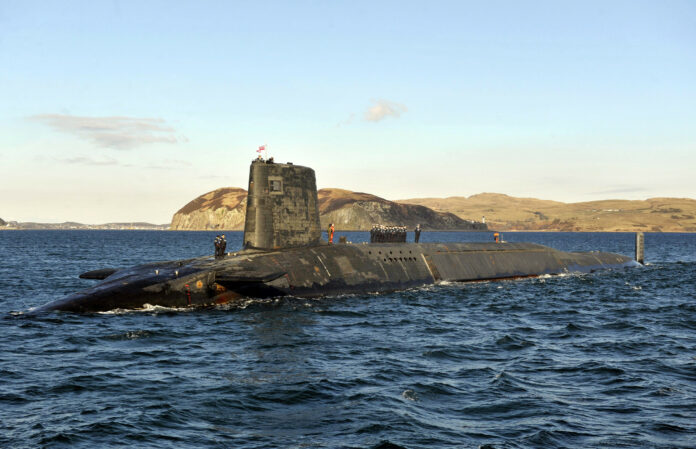British Prime Minister Rishi Sunak will on Monday set out his plan for a “national endeavor” to strengthen the UK’s defense and civil nuclear industry with an investment package running through to 2030.
The prime minister’s office released a statement on Sunday noting its intention to “strengthen the UK’s nuclear deterrent” as NATO states re-evaluate many aspects of defense readiness in what Sunak called “a more dangerous and contested world.”
Downing Street said its plan will see some $252 million invested in British nuclear power and in the country’s nuclear-powered ballistic missile submarines, which serve as a continuous at-sea deterrent. The investment is expected to create 40,000 jobs by 2030.
A new fund will be created for the town of Barrow-in-Furness in the northwest of England, an historic ship-building area which the prime minister’s office said is “central to the UK’s defense nuclear ambitions.” The investment will “help support people taking up jobs, improve transport links and build more homes,” it added.
ANDY BUCHANAN/AFP via Getty Images
Major defense and industry players like BAE Systems, Rolls-Royce, EDF and Babcock will partner with the British government to invest around $962 million in skills, jobs and education by 2030, the statement explained.
The British nuclear industry is undergoing an “unprecedented period of growth” because of the government’s nuclear energy targets, and will need 123,000 new workers by 2030, the release said.
British nuclear submarine building will also be expanding under the AUKUS security pact with the U.S. and Australia, with Canberra acquiring eight new vessels by the 2050s.
“Safeguarding the future of our nuclear deterrent and nuclear energy industry is a critical national endeavor,” Sunak said. “In a more dangerous and contested world, the UK’s continuous at-sea nuclear deterrent is more vital than ever. And nuclear delivers cheaper, cleaner home-grown energy for consumers.
“That’s why we are investing in Barrow, the home of UK submarines, and in the jobs and skills of the future in the thriving British nuclear industry. Today we usher in the next generation of our nuclear enterprise, which will keep us safe, keep our energy secure, and keep our bills down for good.”
Sunak and his Conservative Party are facing a historic defeat in the next general election, which has to be held by January 2025 but will likely be convened some time this year.
His likely successor—Labour Party leader Keir Starmer—has also committed to bolstering British nuclear deterrence and energy.
“The nuclear deterrent is very important to us,” Starmer said during a visit to British troops stationed in Estonia in December. “It is a very important part of the defense of our country that we are strongly committed to, along with our commitment to NATO and to the security of our nation, which is paramount.”
Civilian nuclear power, Starmer said in June, is “a critical part of the UK’s energy mix.” Labour has committed to de-carbonizing British power by 2030, an ambition that includes the completion of two ongoing nuclear power projects, “extending the lifetime of existing plants, and backing new nuclear including Small Modular Reactors.”
Uncommon Knowledge
Newsweek is committed to challenging conventional wisdom and finding connections in the search for common ground.
Newsweek is committed to challenging conventional wisdom and finding connections in the search for common ground.


